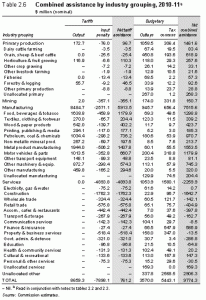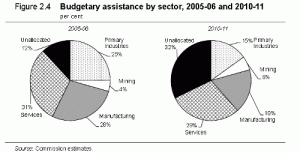“If the ‘end of the age of entitlement’ has come, why does the mining industry get so much assistance?” is a question I’ve seen raised lately by activists. It’s a curious question, because as the Productivity Commission shows, mining receives virtually no assistance at all, as you can see from the following graph and table from their Trade Assistance Review 2010-2011 demonstrates.
Perhaps the lack of assistance is part of the secret of mining’s success.
The first graph shows budgetary assistance by sector contrasting two periods. As the report notes:
The manufacturing and primary production sectors, which together contribute about 10 per cent of value added, received around one third of total estimated budgetary assistance in 2010-11, while the mining sector received relatively little measured assistance.
 This table shows the net assistance by industry. If you click on it you can see that mining receives a net $150.7 m worth of assistance, while producing somewhere around 10% of GDP. Motor vehicle manufacture receives around 8 times that, but only produces a very small fraction of national wealth.
This table shows the net assistance by industry. If you click on it you can see that mining receives a net $150.7 m worth of assistance, while producing somewhere around 10% of GDP. Motor vehicle manufacture receives around 8 times that, but only produces a very small fraction of national wealth.
In fact, mining is penalised by the assistance given to other industries so that you could argue that virtually all the resistance that it receives is necessary to even-up the ledger.

The media are good at not telling people things.
Here is an example that got through but I will bet the majority of Australian never knew this.
Rupert Murdoch receives $882m tax rebate from Australia
The payment by a “foreign tax authority” was revealed in accounts published by News Corporation in the US earlier this month and related to a $2bn claim by News Corp for historic losses on currency transactions by its Australian subsidiaries.
The payment was estimated to be worth $600m to News Corp but the final figure grew to $882m after interest charges.
It was one of the the biggest single factors in the multi-billion dollar federal budget blowout announced by Australian treasurer Joe Hockey in December.
The Australian Tax Office wanted to challenge the claim but was overruled by the Federal Court of Appeal in July last year, the Australian Financial Review reported on Monday.
Comment by Philip S — February 17, 2014 @ 1:44 pm
net combined assistance for mining (tariffs and budgetary) 2011-12 in nominal terms was $493 million compared to $7.35 billion for manufacturing.
http://www.pc.gov.au/__data/assets/pdf_file/0003/123906/04-trade-assistance-review-2011-12-chapter2.pdf
Comment by Chris Lewis — February 18, 2014 @ 6:49 am
I am wondering why, in the graphs and figures provided, don’t I see the diesel fuel rebate included. I know it is worth in excess of $2 billion to the sector.
Comment by Steele Redux — February 19, 2014 @ 3:31 pm
In the last decade we have reportedly plowed some 700 billion into subsides, co-investment, corporate welfare, tax and diesel rebates etc, that have largely enabled foreign firms to compete on a very slanted playing field, that quite severely disadvantages local firms and manufacture.
Moreover, the vagaries of the global market, and the complexity of our own tax system, allows some of these firms to reportedly avoid some or all of their tax liabilities.
More of the same flawed thinking that created these outcomes, privatization, and foreign debt merely masquerading as foreign investment, will not fix the current problems.
Places like Germany, and Scandinavia, have higher (double) labor component costs, yet retain more than viable manufacturing, and car industries, that export to the world.
Doing what we’ve always done has created all of these problems and then some!
More of the same can only ever exacerbate current trends.
Mining needs to stand on its own two feet, and pay fair tax.
To that end we need to completely jettison our current tax regime.
Current compliance with the archaic convoluted complexity of the tax act, costs the bottom line around 7%, and indeed, allows/encourages trillions to be squirreled away in various tax havens.
If a 2% transactions tax would replace current tax revenues, and a number of economists are on the public record claiming it would? Then a 4.8% stand alone unavoidable expenditure tax would raise more than double current revenues.
And that rate would be lower that current compliance costs which could be returned in full to the bottom line. What fool would chose to impose a continuing 7% impost on the bottom line, to avoid a one only tax impost of just 4.8% of the outgoing!
Moreover, the tax rate, could be microscopically varied region by region where desirable, to alone and much more immediately control all inflation or stagnation, meaning the interest rate could be lowered to historically low rates and then left, to turbocharge inflation free growth! Given this single stand alone tax wold raise more than enough revenue, and fix the structural deficit, all other tax raising measures could be jettisoned, including fuel tax and the job killing payroll tax. An expenditure tax is the only fair tax, and only taxes expenditure.
Which then must mean the poorest pay the least, while the biggest spenders pay the most.
And those currently using extremely complex systems to avoid tax, like sending the same sum of money around a financial merry-go-round, through half a dozen or more subsidiaries, simply to create an illusion of business costs and outlays, will pay even more!
It seems to me, the only system we can utilize to absolutely guarantee, that those who earn an income from doing business or engaging in commerce in our country, pay a fair and reasonable share of those earned here profits, is via an entirely unavoidable expenditure tax.
If that then costs the bottom line less than current compliance or avoidance costs, who in their right mind would seek to keep the current costly convoluted system?
Other costs which impact on mining and indeed all commercial activity, are energy, transport and water. We and others have made the mistake of privatizing energy and capital, the very economic support pillars of every western style economy.
Returning these pillars to public ownership will allow us to provide same at actual natural cost, (massively reduced) which is never natural, if it includes tax liabilities, dividends and debt servicing, just to name a few of the eternally cascading costs, that seem part of the supply side of energy and capital?
Besides, governments can still raise funds for worthwhile nation building project, for around half that of private players.
Even then, competently managed private enterprise, can still earn a quid, through the then necessary tender processes!
Cheaper tax, transport, and water, can only ever encourage entrepreneurial enterprise and growth, particularly, high tech manufacture.
Surely we with our lower labor component costs, and huge natural resources, can at least compete with exporting nations like Germany, or regions Like Scandinavia, which have had the good sense to retain and build their economies of scale manufacturing bases. Which in turn then supports a viable and sustainable services sector!
After that we need to clean the self serving dross out of our parliaments, and replace those road blocks in the path of progress, with ideas people, possessed of nation building future vision! And wouldn’t that make a very pleasant change?
Alan B. Goulding.
Comment by Alan B. Goulding — February 19, 2014 @ 5:27 pm
Because Steele it isn’t a subsidy. Users of fuel who don’t use the road get a rebate in recognition of the fact that the excise is supposed to pay for roads. That includes manufacturers, railways, shipping, agriculture, power generators and yes, mining.
Comment by Graham — February 19, 2014 @ 10:00 pm
I’m in favor of jettisoning the fuel excise entirely, given it is little more than a tax on all business, not just mining. And given the tyranny of distance, it’s not just mining and or farming that needs relief.
And no one would be hurt if we adopted a vastly simplified tax system, that allow business, mining and off road users, to pocket current compliance costs.
Given the destiny of demography, we will have to accept a vastly simplified system sooner or later, that directly taxes the GNP, rather than a exponentially shrinking band of tax payers. Sooner would be better!
And no honest tax payer would be hurt, if that new and vastly simplified system included all who currently avoid tax or their fair share.
Meaning the load could be quite massively spread, and the long suffering honest tax payer, given considerable relief.
I can imagine a world where the is no PAYE, PAYG, payroll tax, fuel excise and the ubiquitous cascading GST!
And I can imagine a world were all these time consuming imposts are removed, allowing those in business to work on their businesses, instead of in them!
Alan B. Goulding.
Comment by Alan B. Goulding — February 20, 2014 @ 5:16 pm
We don’t need to subsidize mining, that currently earns billions in repatriated profit for foreign owners, all while routinely avoiding a fair share of tax liability.
Mining royalties is a bigger problem for mining, which has to pay this impost, whether profitable or not.
A universal expenditure tax, and no royalties, would be a better instrument, given it would only tax expenditure outlays, rather than ore mined or profit per se.
And even that could be completely forgiven during a reasonable start up period, say the first 18 months of operation.
Other than that, all mining needs vastly cheaper energy, cheaper transport and water.
We could do worse than to mine the reef for its potential bonanza of low cost low carbon energy products.
It’s is nigh on impossible to harm an already dead reef, which by the way, tourists are staying away from in droves.
Mining the reef and exporting it’s energy products to the world is all we can do, to draw down foreign debt; and sell more to the energy hungry world than we buy from it; and, reverse current downward economic trends. And, end our crippling dependence on foreign capital, which could be earned by us instead, (along with the return our purloined economic sovereignty) as a possible trillion per! Such is the possible size of the probable reserve.
We cannot borrow our way to prosperity, unless borrowed money is plowed into highly profitable income earning projects! And none more profitable than liquid/portable energy, and or, energy import replacement projects!
If subsidies are to continue in any form, then they need to be reserved solely for local firms/players, rather than price gouging foreign carpet baggers, end of story.
Alan B. Goulding.
Comment by Alan B. Goulding — February 23, 2014 @ 11:11 am